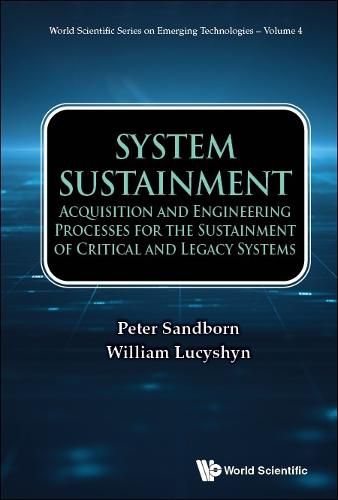Readings Newsletter
Become a Readings Member to make your shopping experience even easier.
Sign in or sign up for free!
You’re not far away from qualifying for FREE standard shipping within Australia
You’ve qualified for FREE standard shipping within Australia
The cart is loading…






This title is printed to order. This book may have been self-published. If so, we cannot guarantee the quality of the content. In the main most books will have gone through the editing process however some may not. We therefore suggest that you be aware of this before ordering this book. If in doubt check either the author or publisher’s details as we are unable to accept any returns unless they are faulty. Please contact us if you have any questions.
‘Sustainment’ (as commonly defined by industry and government), is comprised of maintenance, support, and upgrade practices that sustain or improve the performance of a system and maximize the availability of goods and services while minimizing their cost and footprint or, more simply, the capacity of a system to endure. Sustainment is a multi-trillion-dollar enterprise for critical systems, in both government (infrastructure and defense) and industry (transportation, industrial controls, data centers, and energy generation).This book is a mix of engineering, operations research, and policy sciences intended to provide students with a thorough understanding of the concept of sustainability and sustainable product life-cycles, and an appreciation of the importance of sustaining critical systems. It starts from the key attributes for system sustainment that includes data analytics, engineering analysis and the public policy needed to support the development of technologies, processes, and frameworks required for the management of sustainable processes and practices. The specific topics covered include: acquisition of critical systems, reliability, maintenance, availability, readiness, inventory management, supply-chain management and risks, contracting for sustainment, and various analysis methodologies (discounted cash flow analysis, discrete-event simulation and Monte Carlo methods). Practice problems are included at the end of each chapter.
$9.00 standard shipping within Australia
FREE standard shipping within Australia for orders over $100.00
Express & International shipping calculated at checkout
This title is printed to order. This book may have been self-published. If so, we cannot guarantee the quality of the content. In the main most books will have gone through the editing process however some may not. We therefore suggest that you be aware of this before ordering this book. If in doubt check either the author or publisher’s details as we are unable to accept any returns unless they are faulty. Please contact us if you have any questions.
‘Sustainment’ (as commonly defined by industry and government), is comprised of maintenance, support, and upgrade practices that sustain or improve the performance of a system and maximize the availability of goods and services while minimizing their cost and footprint or, more simply, the capacity of a system to endure. Sustainment is a multi-trillion-dollar enterprise for critical systems, in both government (infrastructure and defense) and industry (transportation, industrial controls, data centers, and energy generation).This book is a mix of engineering, operations research, and policy sciences intended to provide students with a thorough understanding of the concept of sustainability and sustainable product life-cycles, and an appreciation of the importance of sustaining critical systems. It starts from the key attributes for system sustainment that includes data analytics, engineering analysis and the public policy needed to support the development of technologies, processes, and frameworks required for the management of sustainable processes and practices. The specific topics covered include: acquisition of critical systems, reliability, maintenance, availability, readiness, inventory management, supply-chain management and risks, contracting for sustainment, and various analysis methodologies (discounted cash flow analysis, discrete-event simulation and Monte Carlo methods). Practice problems are included at the end of each chapter.